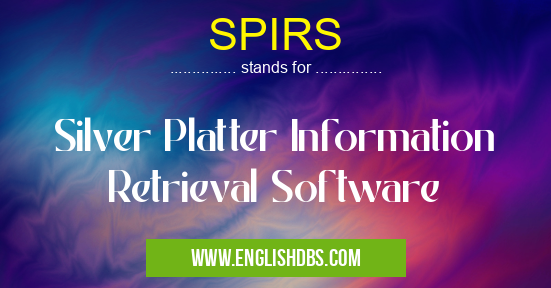What does SPIRS mean in SOFTWARE
SPIRS stands for Silver Platter Information Retrieval Software. It is a powerful software tool used to search and retrieve information from large databases. SPIRS is widely used in libraries, universities, and research institutions to access a variety of resources, including bibliographic databases, full-text articles, and images.

SPIRS meaning in Software in Computing
SPIRS mostly used in an acronym Software in Category Computing that means Silver Platter Information Retrieval Software
Shorthand: SPIRS,
Full Form: Silver Platter Information Retrieval Software
For more information of "Silver Platter Information Retrieval Software", see the section below.
Key Features of SPIRS
- Comprehensive Search Capabilities: SPIRS allows users to perform complex searches using a range of search criteria, including keywords, phrases, authors, and publication dates.
- User-Friendly Interface: SPIRS has an intuitive user interface that makes it easy for both novice and experienced users to navigate and search databases.
- Customizable Search Profiles: Users can create custom search profiles that allow them to save their search criteria and preferences for future use.
- Integration with Other Applications: SPIRS can be integrated with other software applications, such as word processors and citation managers, to streamline the research process.
Benefits of Using SPIRS
- Increased Efficiency: SPIRS saves time and effort by allowing users to search and retrieve information quickly and easily.
- Enhanced Accuracy: The advanced search capabilities of SPIRS help users find relevant and accurate information.
- Improved Collaboration: SPIRS allows multiple users to collaborate on research projects by sharing search results and creating custom search profiles.
Essential Questions and Answers on Silver Platter Information Retrieval Software in "COMPUTING»SOFTWARE"
What is SPIRS (Silver Platter Information Retrieval Software)?
SPIRS (Silver Platter Information Retrieval Software) is a powerful software tool that allows users to search, retrieve, and manage information from a variety of electronic sources, including databases, electronic journals, and websites. It provides users with a comprehensive set of features to facilitate efficient and effective information retrieval, including advanced search capabilities, customizable interfaces, and integrated citation management tools.
What are the key benefits of using SPIRS?
SPIRS offers several key benefits for users, including:
- Comprehensive search capabilities: SPIRS allows users to perform complex and targeted searches across a wide range of information sources, using Boolean operators, field-specific searching, and proximity searching.
What types of information sources can I search with SPIRS?
SPIRS supports a wide range of information sources, including:
- Databases: SPIRS can access and search both structured and unstructured databases, including bibliographic databases, full-text databases, and specialized industry databases.
How do I get started using SPIRS?
To get started using SPIRS, you will need to:
- Obtain access: Contact your institution's library or information services department to inquire about access to SPIRS. Some institutions may provide access to SPIRS as part of their subscription to electronic resources.
Final Words: SPIRS is an essential tool for researchers, librarians, and students who need to access and retrieve information from large databases. Its comprehensive search capabilities, user-friendly interface, and customizable features make it a powerful and efficient research tool.
